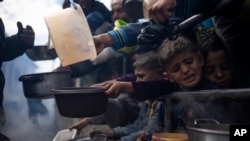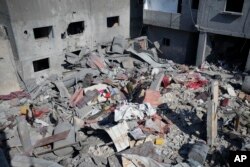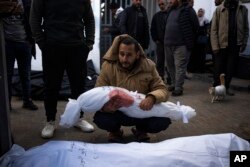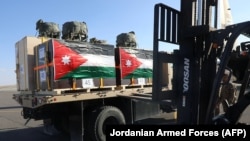The heads of 19 United Nations agencies and partner organizations expressed their frustration in a joint statement Wednesday, calling on Israel "to fulfill its legal obligation" to provide food and medical supplies and facilitate aid operations to Gaza, and for world leaders to prevent an even worse catastrophe from happening.
"Diseases are rampant. Famine is looming. Water is at a trickle. Basic infrastructure has been decimated," the humanitarian coalition wrote. "Food production has come to a halt. Hospitals have turned into battlefields. One million children face daily traumas."
U.N. humanitarian chief Martin Griffiths, chair of the Inter-Agency Standing Committee — a consortium of humanitarian organizations — along with the heads of the World Food Program, the World Health Organization, the U.N. Children's Fund UNICEF, CARE International, Mercy Corps and others, wrote that Palestinian civilians are displaced, traumatized, hungry and have little support.
"We are calling on Israel to fulfill its legal obligation, under international humanitarian and human rights law, to provide food and medical supplies and facilitate aid operations, and on the world's leaders to prevent an even worse catastrophe from happening," they said.
Their statement comes a day after the United States vetoed a Security Council resolution calling for an immediate cease-fire, and as the Palestinian death toll climbs toward 30,000 in less than five months of war between Israel and Hamas. The war was triggered by Hamas' October 7 terror attack inside Israel, which officials there say killed 1,200 people. About 250 others were taken hostage, and about 130 of them remain in captivity.
The U.N. officials said their relief operation is "already on its knees" with only 12 hospitals partially functioning, and their staffers are working in unimaginable circumstances. The officials said no amount of aid will make up for the months of deprivation Gazans have endured, but they remain committed to trying to alleviate the suffering despite the dangers.
"This is our effort to salvage the humanitarian operation so that we can provide, at the very least, the bare essentials: medicine, drinking water, food, and shelter as temperatures plummet," they said.
The committee appealed for an immediate cease-fire, the release of the hostages, and the protection of civilians. They also called for more reliable entry points into Gaza for aid convoys, including into northern Gaza, which has been mostly cut off from aid and where famine is believed to be looming.
Israel denies it is hindering or limiting the delivery of aid and has accused Hamas of diverting it.
Israel's agency for coordinating aid, known as COGAT, says on its website that it has facilitated the entry of more than 250,000 tons of relief, including food, water, medical supplies and shelter equipment to Gaza since the war started, as well as some fuel and cooking gas. On Tuesday, for example, COGAT says 98 aid trucks were inspected and allowed to enter Gaza.
The U.N. says that the current flow is inadequate for the scale of the emergency. Before the war, it says, an average of 500 trucks a day would enter Gaza with aid and commercial supplies for the 2.3 million residents.
The Inter-Agency Standing Committee also made an appeal for funding for the U.N. Relief and Works Agency for Palestine Refugees. UNRWA is the backbone of the humanitarian response in Gaza, but it has faced an existential crisis in recent weeks after Israel accused a dozen employees of participating in the October 7 attacks.
At least 16 countries, including top donor the United States, have suspended their funding to the agency. The staffers were fired, and the U.N. is conducting an internal investigation, as well as commissioning an independent external probe headed up by the former French foreign minister Catherine Colonna.
Israeli officials, including Prime Minister Benjamin Netanyahu, have called for UNRWA to be dismantled. U.N. Secretary-General Antonio Guterres has defended the agency, saying there is no other organization that has a presence in Gaza that could replace it.







